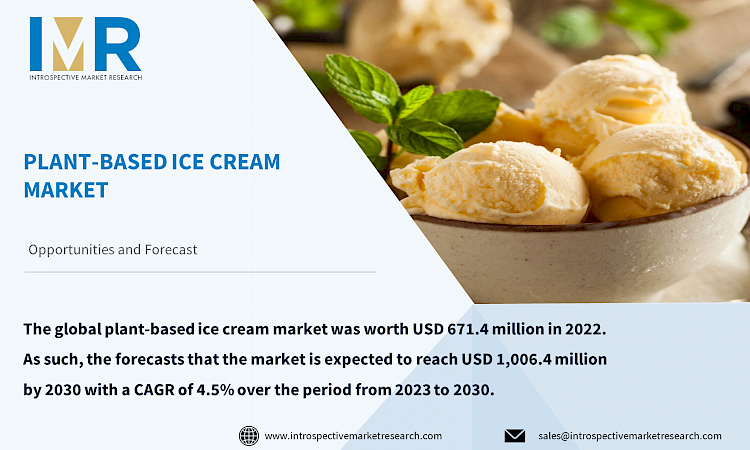Market Overview:
The global plant-based ice cream market was worth USD 671.4 million in 2022. As such, the forecasts that the market is expected to reach USD 1,006.4 million by 2030 with a CAGR of 4.5% over the period from 2023 to 2030.
The plant-based ice creams market has experienced significant growth in recent years, driven by increasing consumer demand for dairy-free alternatives, health consciousness, and ethical considerations. Plant-based ice creams are made from ingredients such as almond milk, coconut milk, soy milk, and cashew milk, offering a variety of flavors and textures comparable to traditional dairy ice creams. Key factors contributing to the market's expansion include rising awareness of lactose intolerance and milk allergies, as well as environmental concerns related to animal agriculture.
Major players in the food industry have responded by introducing a wide range of plant-based ice cream products, leveraging innovative formulations and marketing strategies to cater to diverse consumer preferences. Furthermore, technological advancements in food processing have improved the taste, texture, and overall quality of plant-based ice creams, enhancing their appeal to mainstream consumers. The market is expected to continue its growth trajectory, fueled by ongoing product innovation, expanding distribution channels, and increasing consumer acceptance of plant-based diets.
Top Key Players Covered in The Plant-based Ice Creams Market:
- Ben & Jerry's (United States)
- Häagen-Dazs (United States)
- So Delicious Dairy Free (United States)
- Alpro (Belgium)
- NadaMoo! (United States)
- Oatly (Sweden)
- Coconut Bliss (United States)
- Perfect Day (United States)
- Nush Foods (United Kingdom)
- Van Leeuwen (United States)
- Nobó (Ireland)
- Daiya Foods (Canada)
- Booja-Booja (United Kingdom)
- Eclipse Foods (United States)
- Tofutti Brands Inc. (United States)
- Arctic Zero (United States), and Other Major Players
Market Dynamics and Factors:
The driving factors for the plant-based ice cream market include growing consumer awareness regarding health and environmental concerns associated with dairy products. As people become more health-conscious and environmentally aware, they are seeking alternatives to traditional dairy ice cream. Additionally, the increasing prevalence of lactose intolerance and dairy allergies has fueled the demand for plant-based alternatives. Opportunities in this market lie in product innovation and expanding distribution channels.
Companies have the chance to develop new flavors and improve the texture and taste of plant-based ice cream to attract more consumers. Moreover, expanding distribution networks, including online retail and partnerships with grocery stores and restaurants, can help reach a wider audience. Additionally, taste preferences and texture differences between dairy and plant-based ice creams can be a barrier to adoption for some consumers. Moreover, the limited availability and accessibility of plant-based ingredients in certain regions may hinder market growth.
The Plant-based Ice Creams Market Report Highlight:
- By Form, In the plant-based ice cream market, the singles segment holds dominant sway, capturing consumer interest with its convenient packaging and portion control. Singles, ranging from individual cups to bars, offer versatility and on-the-go indulgence, catering to modern lifestyles. This segment caters to diverse preferences, featuring an array of flavors and dietary options, such as gluten-free or low-sugar varieties, appealing to health-conscious consumers.
- By Flovour, the increase in consumer preference for natural and healthy alternatives to standard desserts is driving market demand for fruit-flavoured plant-based ice creams. There is a connection between the taste of fruit and how healthy it is said to be; this correlates with the fact that health-conscious consumers are increasingly opting for alternatives without dairy.
- By Region, the market for plant-based ice cream in the Asia-Pacific region, including emerging economies like Japan, China and India is discussed. Among major factors driving the growth of plant-based ice cream market at large are rise in health awareness and new products launch by players. While the consumers prefer ice, cream made with almond and coconut milk instead of soy milk, the latter is healthier and has a better taste.
Key Industry Development:
- In December 2023, food giant ADM announced the acquisition of FDL, a UK-based developer and producer of premium flavor and functional ingredient systems. This indicates ADM's focus on building its capacity for innovative flavors, potentially catering to the evolving plant-based ice cream market.
- In January 2023, Unilever, a major player in the traditional ice cream market, acquired Betty Ice, a Romanian ice cream producer. This move suggests Unilever's intention to strengthen its presence in the plant-based segment, leveraging Betty Ice's existing expertise.
The Plant-based Ice Creams Market Segmentation:
By Form
- Blends
- Singles
By Flavour
- Beans
- Nuts
- Fruits
- Herbs
By Packaging Type
- Tubs
- Cones
- Bars
By Source
- Coconut Milk
- Soy Milk
- Almond Milk
- Cashew Milk
By Distribution Channel
- Supermarkets and Hypermarkets
- Convenience stores
- Specialty stores
- Online retail
For this report, Introspective Market Research has segmented the PLANT-BASED ICE CREAMS Market based on region:
Regional Outlook (Revenue in USD Million; Volume in Units, 2023-2030)
North America
- The U.S.
- Canada
- Mexico
Eastern Europe
- Russia
- Bulgaria
- The Czech Republic
- Hungary
- Poland
- Romania
- Rest of Eastern Europe
Western Europe
- Germany
- UK
- France
- Netherlands
- Italy
- Spain
- Rest of Western Europe
Asia Pacific
- China
- India
- Japan
- Singapore
- Australia
- New-Zealand
- Rest of APAC
Middle East & Africa
- Turkey
- Saudi Arabia
- Qatar
- UAE
- Israel
- South Africa
South America
- Brazil
- Argentina
- Rest of SA








